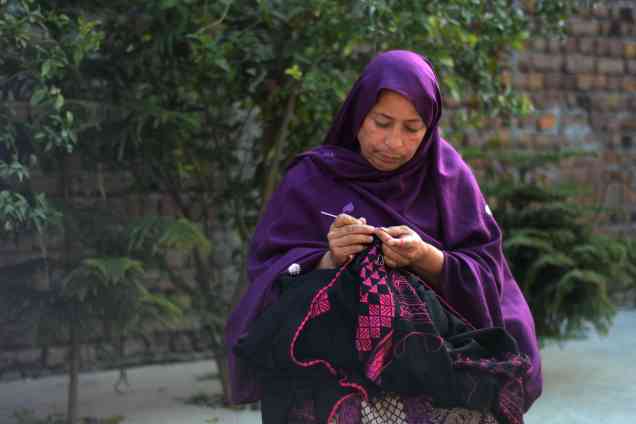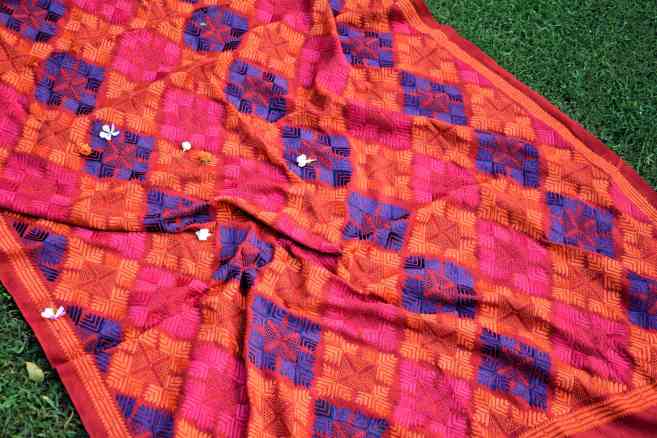By Sonya Rehman
Throughout her life, Naseem Akhtar had a natural inclination towards hand embroideries. As a young woman, she would stitch gorgeous cushion covers in her free time, while also experiment with crochet work.

However, when she got married, Akhtar and her husband were struggling to make ends meet. It was around this time that she discovered the craft of phulkari – an ancient craft that some experts say originated in Punjab in the 15th century.
From striking geometric and floral patterns, traditionally embroidered in bright silk thread against plain, thick fabric, phulkari – meaning ‘flower craft’ – was once an important part of a bride’s trousseau in South Asia.

Based in Haripur, a city in Hazara (in Pakistan’s Khyber Pakhtunkhwa province), Akhtar states that she felt compelled to learn phulkari needlework because the motifs and color patterns fascinated her. After learning the craft at a center in her area within a month, Akhtar began embroidering clothes that she would then sell to friends and women in the neighborhood.
While raising six children (five girls and a boy), Akhtar would work for hours on end, between household chores, to create more pieces to sell. Over time, the enterprising craftswoman began displaying her work at local festivals and exhibitions, apart from taking on orders for customized pieces for clients.

“A single tunic can sometimes take a month to embroider,” she says, “And a shawl full of phulkari needlework can take anywhere between six months to a year. Since this craft is done by hand, unlike machine embroideries, it is a very slow and methodical process.”
Today, having educated all her children, one of whom is pursuing a degree in China, Akhtar is part of a very small percentage of craftswomen who are allowed to pursue a career and employment opportunities. Due to rigid cultural norms, many women are restricted to their homes and therefore have no hope of financial independence.
Currently working with roughly 300 women artisans from impoverished communities in Haripur, Akhtar states that she was driven to visit villages to recruit women who urgently needed a source of income.
“I could relate with what they were experiencing, because I had experienced the same fear and desolation that comes with the territory of being poor,” she says.
But Akhtar attributes her success to pure luck.
“I’m a phulkari artisan and I will always be one,” she states with pride. “Even though I’m uneducated and my family and I have seen very difficult days, my husband has always supported me and encouraged my work. I realize how privileged I am compared to countless other women in Pakistan.”

Having exhibited her shawls, apparel and home textiles locally, over the course of two decades, Akhtar has also taken her work overseas; to India, Malaysia and Dubai.
“Never in my wildest dreams did I think it would be possible,” she says, reminiscing about her travels, “God has given me so much and I feel so privileged to be able to do what I’m passionate about. This work is my identity.”
Currently preparing for an online exhibition for Kaarvan Crafts Foundation, a local non-profit, Akhtar enjoys using social media to reach a wider network of clients.
With her very own Instagram and Facebook page, the craftswoman even has a profile on Vceela, an online portal for Pakistani artisans to sell their work. She even loves using WhatsApp – as and when her phulkari pieces are completed, Akhtar wastes no time in sending out pictures and excited voice notes to her clients about her new stock.
This is the new normal for Akhtar during COVID-19: using technology to sustain her work and her craft.
However, the threat of hand embroideries being completely obliterated by machine work and fast fashion worries Akhtar from time to time.
“Machine embroideries are pushing our crafts out of business,” she says, “There needs to be more awareness, including opportunities that bring Pakistan’s artisans forward. They need to be given a platform or else our crafts are at risk of dying out.”
Forbes
Love hand embroidered pieces. They’re like living pieces
Phulkari is one of the most beautiful kinds of embroidery. Thanks for sharing